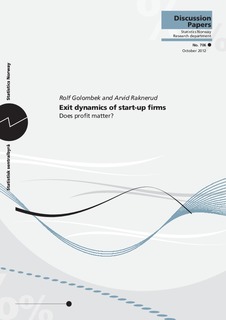Exit dynamics of start-up firms. Does profit matter?
Working paper
Published version

Åpne
Permanent lenke
http://hdl.handle.net/11250/2628089Utgivelsesdato
2012-10Metadata
Vis full innførselSamlinger
- Discussion Papers [1003]
Sammendrag
While little attention has been paid to the role of profitability in the empirical literature on firm exit, we employ a detailed recently established database of Norwegian manufacturing firms to identify the extent to which profitability explains a firm's exit behavior. Some key characteristics of the data are: i) 25 percent of firms that exited experienced positive profits every year before exit, ii) there is no negative profitability shock immediately prior to exit, and iii) firms may continue production, even though they frequently experience negative profits. We use these data to estimate a theory-founded econometric model of exit, where the exit and investment decisions of firms are formulated as the solution to a discrete-continuous dynamic programming problem. In particular, the probability of exit depends on profitability, which is not directly observable to the econometrician. We estimate this model for six manufacturing industries and find that increased profitability lowers the probability of exit and that this effect is statistically significant in all industries. We show that the difference in annual exit probability between firms that exited during the observation period (1994–2009) and firms that did not exit is highly persistent over time, and there is no tendency for a sharp increase in the estimated exit probability just prior to exit. Hence, it is the cumulative effect of the higher risk of exit over several years, compared with the average firm, that causes firms to exit.
Utgiver
Statistisk sentralbyråSerie
Discussion papers;706Beslektede innførsler
Viser innførsler beslektet ved tittel, forfatter og emneord.
-
The impacts of alternative policy instruments on environmental performance. A firm level study of temporary and persistent effects
Bye, Brita; Klemetsen, Marit Elisabeth (Discussion papers;788, Working paper, 2014-10)We study the effects of various environmental regulations on environmental performance measured as emission intensity. Moreover, we aim to test whether any such effects are persistent or only temporary. Conventional theory ... -
The welfare effects of carbon policies: grandfathered quotas versus differentiated taxes
Bye, Brita; Nyborg, Karine (Discussion Papers;No. 261, Working paper, 1999)Recently, it has been demonstrated that pre-existing distortionary taxes can substantially increase the costs of market-based instruments which do not raise revenue, such as non-auctioned emissions quotas. Revenue-raising ... -
Labour market rigidities and environmental tax reforms : welfare effects of different regimes
Bye, Brita (Discussion Papers;No. 242, Working paper, 1998)The working of the labour market is important for the total welfare effects of tax reforms. This paper analyses, by using a computable general equilibrium model for the Norwegian economy, how different assumptions about ...